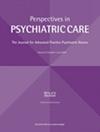An Assessment of Pediatric Nurses Awareness and Perceived Knowledge of Autism Spectrum Disorders: A Gulf State Survey
IF 1.9
4区 医学
Q2 NURSING
引用次数: 0
Abstract
Background. The purpose of this study was to determine pediatric nurses’ knowledge of autism spectrum disorders (ASD). Methods. We conducted a population-based online survey of 273 pediatric nurses in eastern Saudi Arabia using convenience sampling method. Perceived knowledge was assessed using the knowledge of childhood autism among Health Professionals Questionnaire (KCAHW) that was translated into Arabic. We used multivariate regression analysis to determine the influence of demographic factors on the perceived knowledge. Using Pearson’s correlation analysis, we assessed the correlation between the outcome variables and the predictor variables. Results. ASD knowledge is generally higher among pediatric nurses with higher academic qualifications (r = 0.29, < 0.001). They scored higher on general knowledge (M = 21.5, SD = 5.7) and lower on signs and symptoms (M = 15.2, SD = 4.3), diagnosis (M = 13.8, SD = 3.9), and management of ASD (M = 12.4, SD = 4.1). A significant correlation was found between mean KCAHW and age (r = 0.12, = 0.029), sex (r = 0.18, = 0.003), years of experience (r = 0.25, < 0.001), education level (r = 0.34, < 0.001), and hospital type (r = 0.21, = 0.001). Predictors of knowledge and understanding were level of education (β = 0.23, = 0.001), formal training (β = 0.16, = 0.012), and years of experience (β = 0.19, = 0.005). The majority could not define ASD or recognize early signs and symptoms or associated comorbidities. Lack of social and emotional reciprocity and impaired language development have been reported, as well as the perception of ASD as a neurodevelopmental disorder. Conclusion. Higher academic qualifications are associated with high general knowledge of ASD; however, nurses in this cohort performed poorly in ASD sign and symptom recognition, diagnosis, and management.儿科护士对自闭症谱系障碍的认知和认知知识评估:海湾国家调查
背景。本研究的目的是了解儿科护士对自闭症谱系障碍(ASD)的认知。方法。我们采用方便抽样的方法对沙特阿拉伯东部273名儿科护士进行了一项基于人群的在线调查。使用翻译成阿拉伯语的卫生专业人员儿童自闭症知识调查表(KCAHW)评估感知知识。我们使用多元回归分析来确定人口学因素对感知知识的影响。使用Pearson相关分析,我们评估结果变量与预测变量之间的相关性。结果。学历越高的儿科护士对ASD的了解程度普遍越高(r = 0.29, p <0.001)。他们在一般知识(M = 21.5, SD = 5.7)方面得分较高,而在症状和体征(M = 15.2, SD = 4.3)、诊断(M = 13.8, SD = 3.9)和ASD管理(M = 12.4, SD = 4.1)方面得分较低。平均KCAHW与年龄(r = 0.12, p = 0.029)、性别(r = 0.18, p = 0.003)、工作年限(r = 0.25, p <0.001)、教育程度(r = 0.34, p <0.001)、医院类型(r = 0.21, p = 0.001)。知识和理解的预测因子为教育水平(β = 0.23, p = 0.001)、正规培训(β = 0.16, p = 0.012)和经验年数(β = 0.19, p = 0.005)。大多数不能定义ASD或识别早期体征和症状或相关合并症。缺乏社交和情感互惠,语言发育受损,以及将ASD视为一种神经发育障碍都有报道。结论。较高的学历与ASD的高常识相关;然而,该队列中的护士在ASD症状和体征的识别、诊断和管理方面表现不佳。
本文章由计算机程序翻译,如有差异,请以英文原文为准。
求助全文
约1分钟内获得全文
求助全文
来源期刊
CiteScore
5.00
自引率
4.30%
发文量
139
审稿时长
>12 weeks
期刊介绍:
Perspectives in Psychiatric Care (PPC) is recognized and respected as THE journal for advanced practice psychiatric nurses. The journal provides advanced practice nurses with current research, clinical application, and knowledge about psychiatric nursing, prescriptive treatment, and education. It publishes peer-reviewed papers that reflect clinical practice issues, psychobiological information, and integrative perspectives that are evidence-based. Perspectives in Psychiatric Care includes regular columns on the biology of mental illness and pharmacology, the art of prescribing, integrative perspectives, and private practice issues.

 求助内容:
求助内容: 应助结果提醒方式:
应助结果提醒方式:


